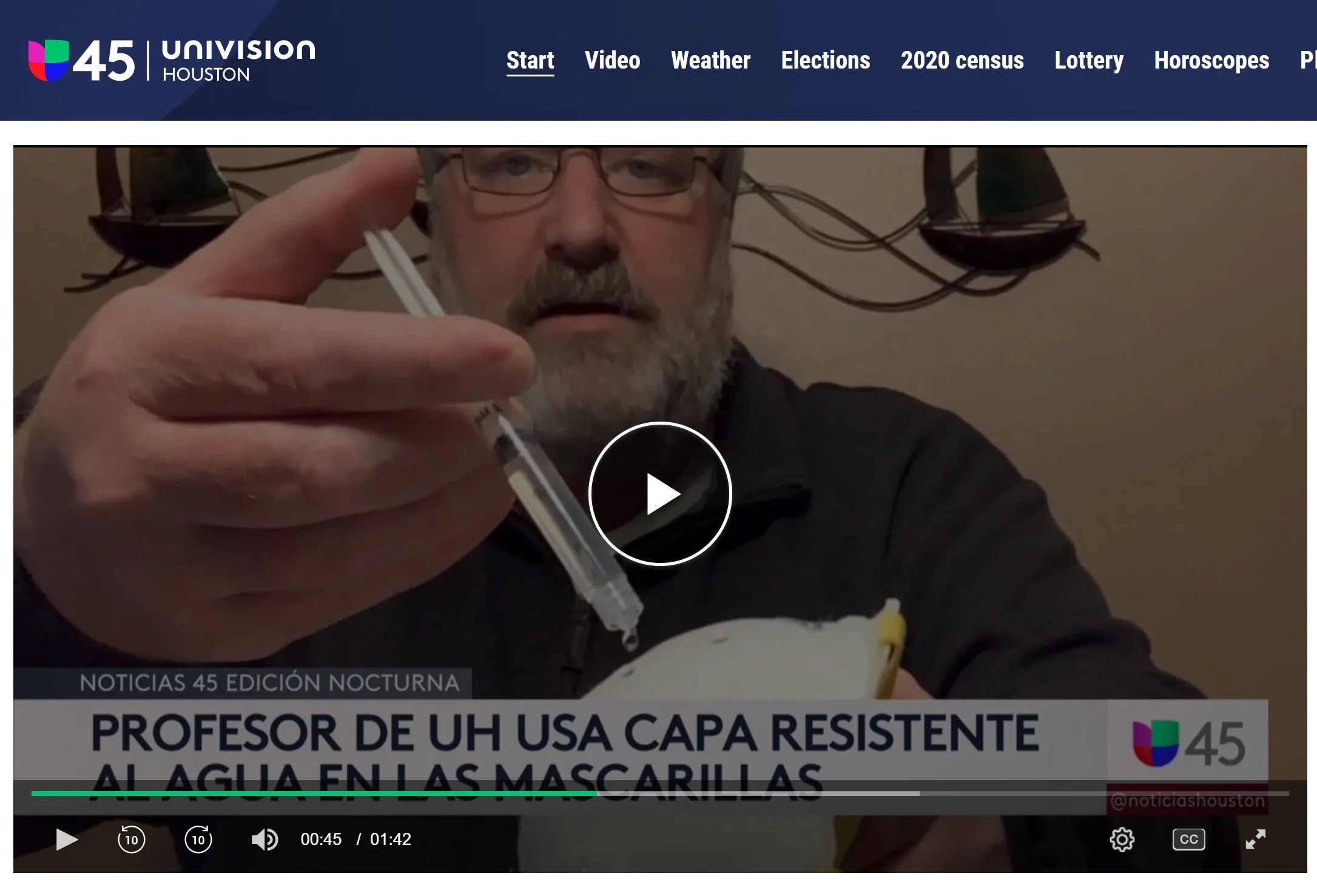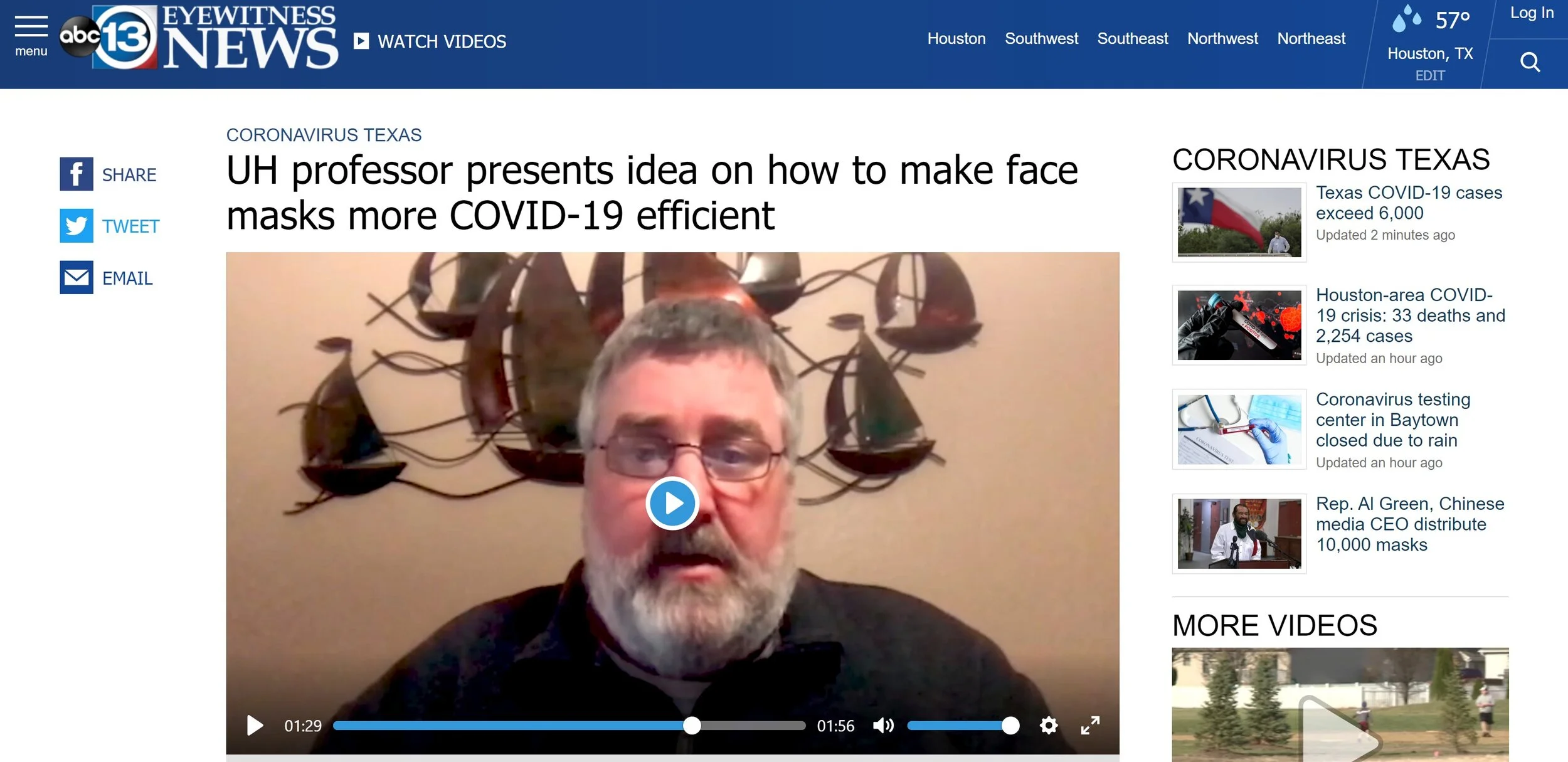Dr. Seamus Curran, a professor of physics at the University of Houston, doesn’t mince words when it comes to society’s need to adjust to the new normal and don masks in public to combat the spread of COVID-19.
“We left normal in December,” Curran tells CultureMap, “and, when everyone was planning their New Year’s resolutions, little did we know that the old normal of before is gone. None of us saw that life passing away — and it was taken away by a bug 1,000 times smaller than lice. And like lice, it’s going to be with us for a long time.”
Media Release
FOR IMMEDIATE RELEASE
March 30, 2020
Innovative Nanotechnology Coating Could Ease Critical Shortage of Masks
Improves protection for health, emergency professionals
Houston, March 30, 2020 – Integricote has announced a breakthrough coating that creates a droplet / fluid / water-repellent barrier, making inexpensive (and more readily available) masks and other PPE products an effective way to hinder SARS-CoV-2.
The innovative new coating, based on a decade of research and many US and international patents and filed applications, is designed to address and meet the emergency need for Personal Protective Equipment (PPE). It is designed to specifically deliver a protective coating for facemasks, surgical scrubs, air filters, and bed linens.
Integricote’s founder, a 30-year nanotechnology veteran and UH professor, Dr. Shay Curran, said “At a time when specialized medical safety equipment is in critical demand and short supply, we are excited to offer a real solution to provide water repellent coatings that work on painters masks, fabrics, and vent filters made from fiberglass and fabrics. This effectively reduces the risk of any waterborne organism – including the Coronavirus SARS-CoV-2 – from penetrating a coated fabric.”
The nanocoating is available now for manufacturers of PPEs. It can also be used on older out-of-date N95 masks or lower cost masks that need to be enhanced. Before using masks, scrubs, etc., have suppliers spray on the coating to give front line health workers added protection.
“Using cloths, scarves, homemade masks, and other fabrics is not a good move. We don’t have to go there when Integricote can help now. Tell your health officials, your PPE suppliers, your governor, and other elected officials that there are other options. This is where the US needs to be winning the war against COVID-19. Our focus should be on finding a cure, doing the right thing, and protecting our frontline workers,” according to Curran.
About Integricote: Established in 2013, Integricote is a nanocompany that has been working on water repellent coatings on many surfaces including fabrics, tarps, wood, and masonry. Integricote products and solutions are designed to improve the nature and quality of the surfaces we protect. The technology was developed in the materials/chemistry labs (Institute for NanoEnergy) of the physics department at the University of Houston.
###
Contact Becky Scott at becky@integricote.com for more details on how we can help your state and local hospitals – this is not for individuals right now but for medical suppliers and manufacturers.
UH Nanotech Startup Enters the ‘Green’ Energy Market
Huge congratulations to our CEO, Prof. Shay Curran, for being featured in the UH Media.
Sealer Protects Clean-Burning Wood Pellets from Water Damage
Jeannie Kever
jekever@uh.edu
713-743-0778
Global energy demand is growing as developing nations expand electric service, prompting efforts to find a readily available source of fuel that is more environmentally friendly than coal.
A nanotechnology company based at the University of Houston’s Technology Bridge research park has a suggestion.
Countries in Europe and Asia already are using wood pellets – a form of biomass made up of compressed sawdust and other wood waste – to fuel power generating stations in an effort to cut fossil fuel emissions.
There are drawbacks, including the fact that the pellets disintegrate easily if exposed to water or even high humidity, raising the cost of storage and transportation. Using solid wood pellets can help, but that raises the cost substantially.
Seamus “Shay” Curran, a physicist at UH and CEO of Integricote, said researchers have discovered that a nanotech coating can protect the composite pellets from degradation without affecting how they burn or the amount of energy they can produce.
The company launched in late 2013, marketing a water- and stain-repellant coating developed by Curran. It later changed its name to Integricote and now offers products to seal and stain wood, masonry and concrete. They work by penetrating the surface of the material and forming a protective barrier below.
The pellets don’t burn as hot as coal, so more pellets must be burned to produce an equivalent amount of energy. But Curran said the pellets are a green energy solution because they produce fewer emissions than either coal or larger chunks of wood and can be produced from wood waste.
“It makes sense to use this,” he said. “We have issues with coal, so could we change our coal-fired plants to use something else?”
Wood pellets are produced in the United States and Canada, making them a domestic energy solution, Curran said.
Integricote markets its sealers and stains under the name CaraPro and produces them in facilities at the UH Technology Bridge (formerly known as the Energy Research Park) on the Gulf Freeway.
They are available on the East Coast through a distributor and are also sold through the website.
The coating for pellets would be the company’s first industrial product; Curran said Integricote is currently looking for a partner to produce the treated pellets.
“I got into this thinking I could solve a problem,” he said. “We don’t have to shut down every coal plant to be thinking green.”
- Jeannie Kever, University Media Relations








